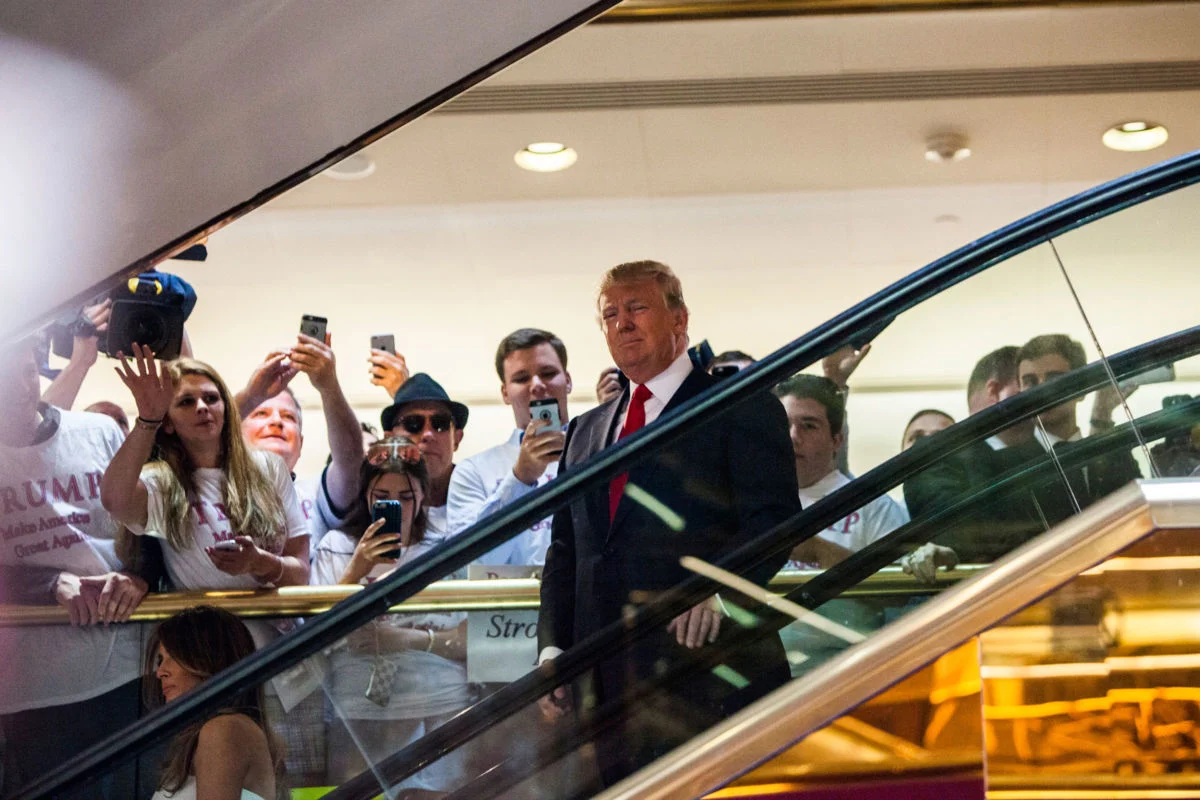Trump Demanding Answers About Escalator At UN

Escalator Malfunction at the United Nations Sparks Global Attention
The escalator may have stopped, but the controversy surrounding it is only escalating. On Tuesday, President Trump and the first lady stepped onto an escalator at the United Nations headquarters, only for the moving staircase to suddenly grind to a halt. The unexpected malfunction forced the president and his entourage to walk the rest of the way up, leaving many surprised at how such a disruption could occur in one of the world’s most secure institutions. UN officials quickly responded, stating that the incident appeared to be accidental. According to their explanation, a videographer traveling with the president’s delegation may have unintentionally triggered the safety mechanism by stepping back onto the escalator after reaching the top. While it was initially brushed off as a minor inconvenience, the moment soon became the subject of political commentary and public debate.
Trump’s Reaction Shifts from Humor to Accusation
During his speech later that day, Trump turned the incident into a lighthearted remark, joking that all he received from the United Nations was “an escalator that stopped halfway up.” Yet by the next day, his tone had shifted dramatically. Posting on social media, he stressed the seriousness of the malfunction, writing that he and the first lady were lucky not to have fallen forward onto the steel steps. He described the situation as “absolutely sabotage” and pointed to reports in the London Times suggesting that UN workers had joked about shutting down escalators and elevators. The remarks linked the event to his administration’s decision to cut funding to the UN, reframing what might have been a technical glitch as part of a larger controversy.
Trump’s Initial Humor Gives Way to Accusation
In his speech later that day, Trump attempted to turn the mishap into a joke. With characteristic bluntness, he remarked that all he received from the United Nations was “an escalator that stopped halfway up.” Laughter rippled through some circles, and the remark was initially taken as an attempt to downplay the embarrassment.
But by the following day, Trump’s tone had shifted dramatically. Posting on his social media platform, he described the situation as far more serious than it appeared. He noted that both he and the first lady could have been badly injured had they fallen forward onto the steel edges of the steps. “It was only because we were holding the handrails tightly that it did not become a disaster,” he wrote.
Trump went further, claiming that the incident amounted to sabotage. He cited an article in the London Times which reported that UN staffers had joked about switching off escalators and elevators. According to the article, staffers linked the remarks to Trump’s decision to reduce US funding to the organization. Whether intended as humor or not, the comments inflamed speculation that the escalator stoppage was deliberate. For Trump, this was no coincidence—it was part of a broader pattern of resistance and hostility toward his administration.
Allegations of Sabotage and Security Questions Raised
The report referenced by Trump suggested that UN staff had made light of the idea of disabling equipment, later commenting that the organization had “run out of money” to maintain basic operations. For Trump, this appeared to reinforce the notion that the malfunction was deliberate. In his posts, he demanded that all security footage of the escalator incident be preserved, particularly the footage surrounding the emergency stop button. He further noted that the Secret Service had become involved, underscoring his concerns about sabotage and security failures. Beyond the political implications, the episode drew attention to the reliability of infrastructure in high-profile international venues and the potential consequences of technical disruptions.
Productivity and Time Management in High-Pressure Settings
For observers, the escalator stoppage was more than a safety issue, it was a reminder of how even small interruptions can derail schedules in high-pressure environments. In diplomacy and politics, time optimization is critical, with leaders depending on strict daily routines and seamless coordination to stay on track. The malfunction, whether accidental or intentional, interrupted a moment designed to symbolize efficiency and control. Productivity experts often emphasize that the best daily habits involve preparation for the unexpected, flexibility in response to disruptions, and strategies to maintain focus. In this case, the president’s experience reflected a reality familiar to many: unforeseen obstacles can interfere with productivity, making resilience and adaptability essential.
Technical Failures Highlight Dependence on Modern Systems
Trump’s complaints extended beyond the escalator, as he also cited technical problems with the teleprompter and audio during his speech. He described these issues as additional signs of sabotage. The reliance on technology to streamline operations, from escalators to speech systems, highlights both the efficiency and vulnerability of modern routines. When these tools function, they save time and improve productivity. When they fail, they create delays, frustration, and in this case, international headlines. The incident underscored the importance of backup strategies, both for political leaders and for anyone seeking to manage their daily time effectively.
Allegations of Sabotage and Heightened Security Concerns
The suggestion of sabotage raised immediate questions about safety and security at the UN. Trump demanded that all surveillance footage related to the incident be preserved, including any images showing the emergency stop button. He emphasized that the Secret Service had become involved and that an investigation was warranted.
Observers noted that such concerns were not unfounded. In an institution that hosts world leaders and diplomats from around the globe, any malfunction, even minor, could have serious consequences. An escalator stopping abruptly may sound trivial, but in the wrong circumstances, it could cause injuries, panic, or disruption to carefully planned schedules.
The accusations also shone a light on how infrastructure failures can feed political narratives. For Trump, the escalator and teleprompter malfunctions became symbols of institutional hostility. For critics, they were examples of how small mishaps could be exaggerated into conspiracy. For productivity experts, however, the incident illustrated a more universal point: in high-pressure environments, time optimization and resilience are key.
Dependence on Technology and the Risks of Failure
The escalator was not the only malfunction Trump complained about. He also cited problems with the teleprompter and audio systems during his speech, describing them as further signs of sabotage. Taken together, the issues drew attention to the dependence on technology in modern institutions.
Escalators, teleprompters, microphones, and other automated systems are designed to save time and streamline operations. They make routines smoother, reduce the need for manual intervention, and allow leaders to focus on content rather than logistics. Yet when these systems fail, they disrupt not only the schedule but also the perception of professionalism.
For productivity analysts, this reinforces an important lesson: while technology is indispensable for optimizing daily routines, it should never be the sole safeguard. Just as individuals keep backup planners, extra chargers, or printed copies of schedules, institutions must build redundancy into their systems. Without contingency planning, even minor malfunctions can spiral into crises.










